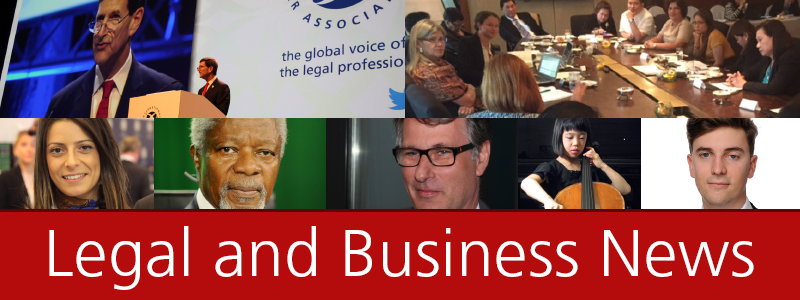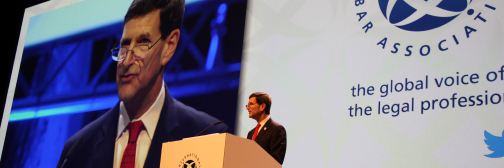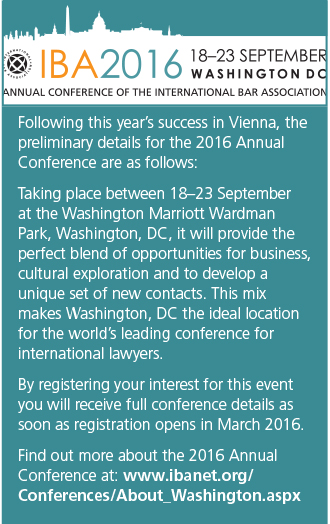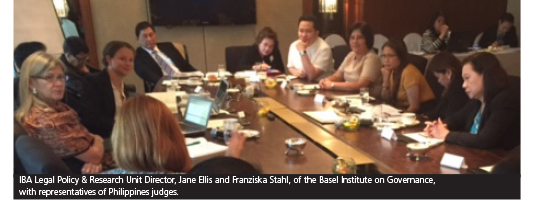Legal and business news from the IBA - December 2015/January 2016

ISIS terrorist attacks: despite egregious violations response must comply with international law
Ruth Green
Recent terrorist atrocities perpetrated by ISIS have violated both domestic and international laws, according to Juan Méndez, UN Special Rapporteur on Torture and a member of the IBA Task Force on International Terrorism.
‘The attacks in Paris and Beirut and against the Russian civilian aircraft are undoubtedly violations of domestic law of several countries; they are also egregious breaches of the international law applicable to armed conflict and inhumane acts with tragic effects,’ he says. ‘They deserve a robust response that needs to be framed within the law that the terrorists violate.’
As part of the Task Force, Méndez contributed to a 2011 IBA report that examined issues of accountability, remedies and recommendations for reform of international law. Speaking to him four years on, he believes that international law is equipped to cope with even the extreme guerrilla tactics of a still-emerging terrorist organisation such as ISIS.
‘I do feel that the international law standards on terrorism and human rights are not only precise and binding as a matter of law,’ he says, ‘but they also contribute to making the struggle against terrorism more effective because they provide the moral high ground to the states that decide to fight terrorism within the rule of law. In fact, our recommendations are, if anything, more urgent now than ever.’
Javed Rehman, a professor specialising in Islamic law at Brunel University in London who was also a member of the Task Force, told Global Insight that ISIS had created some unprecedented legal and other challenges.
‘When we were working on the report ISIS was not as prominent,’ he says. ‘Obviously non-state actors and state actors were important at that time, but ISIS is a problematic breed because it has claims to have characteristics of a state and yet it is a terrorist group. It’s not clearly a non-state actor and it clearly wants to establish itself a territorial jurisdiction.’
“ The international law standards on terrorism and human rights… provide the moral high ground to the states that decide to fight terrorism within the rule of law
Juan Méndez
UN Special Rapporteur on Torture
The sheer scale and complexity of the series of coordinated shootings, suicide bombings and hostage-taking that terrorised central Paris on
13 November garnered international attention. Eighty-nine people were shot dead at the Bataclan Theatre. A total of 130 people have now been reported dead and more than 350 wounded, making this France’s deadliest attack since the Second World War and the worst seen in Europe since the 2004 Madrid bombings.
With ongoing pressure on the international community to resolve the conflict in Syria, Justice Richard Goldstone, Honorary President of the IBAHRI, who chaired the IBA Task Force on International Terrorism, believes collective action is the best course of action to overcome such threats. ‘In our report we stress that collective campaigns to stop terrorism are more desirable than unilateral action. It’s encouraging to see that steps are being made in that direction in terms of the lawful attacks being made on ISIS in Syria, which certainly, in my view, comply with international humanitarian law.’
Goldstone stresses the importance of lawyers, the rule of law and tolerance in ensuring justice prevails. ‘I would also stress that no matter how egregious terrorist acts are, that should in no way diminish the rule of law or the rights of suspects to a fair trial and due process. The Bar also has a very important role to play in safeguarding the rule of law and fair trials. Those who take on unpopular process should in no way be deterred or fear that they’re acting dishonourably.
‘Clearly ISIS is an extreme group that is causing havoc in so many different areas and there is absolutely no possible justification for it. At the same time, it seems also to be important that all Muslims should not be tarnished with the same brush. It’s also very important to protect their lives.’
Read this article in full at tinyurl.com/ISISattacksParis
In memoriam Valentin Ribet
 It is with great sadness that the IBA has suffered the loss of Valentin Ribet. He was among the victims of the ISIS terrorist attack at the Bataclan concert hall, Paris on Friday 13 November.
It is with great sadness that the IBA has suffered the loss of Valentin Ribet. He was among the victims of the ISIS terrorist attack at the Bataclan concert hall, Paris on Friday 13 November.
Valentin was an individual group member of the IBA (one of the lawyers nominated by group member firm Hogan Lovells). A 26-year-old associate at the firm's Paris office, Ribet worked in the litigation team, specialising in white collar crime.
Contacted by the IBA to extend the Association’s condolences, Philip Boys, Partner at Hogan Lovells, Paris said: ‘We have been overwhelmed by the number of messages of support such as yours which we have received from literally all over the world. It helps much more than any terrorist would ever understand.
‘Valentin Ribet was a very promising young lawyer.’
Federica D’Alessandra is Outstanding Young Lawyer of the Year 2015
 The IBA Young Lawyers’ Committee Outstanding Young Lawyer of the Year Award was presented to Federica D’Alessandra at the Annual Conference. She is a fellow at the Harvard Carr Center for Human Rights Policy, Boston. She is also an officer in the Human Rights Law Working Group and War Crimes Committee within the IBA.
The IBA Young Lawyers’ Committee Outstanding Young Lawyer of the Year Award was presented to Federica D’Alessandra at the Annual Conference. She is a fellow at the Harvard Carr Center for Human Rights Policy, Boston. She is also an officer in the Human Rights Law Working Group and War Crimes Committee within the IBA.
The judging panel said of this year’s award: ‘While there were many worthy nominees, Federica’s high-level experience dealing with important issues in international law and human rights was uniquely impressive. The profile she has been able to build in so short a time is extraordinary.’
The award, sponsored by LexisNexis, in recognition of the late William Reece Smith Jr, is presented annually to a young lawyer who has shown not only excellence in their work and achievements in their career to date, but also a commitment to professional and ethical standards.
IBA Legal Policy & Research Unit
The IBA is delighted to announce that, following the introduction of the new Director of the Legal Projects Team, Jane Ellis, and a strategic reform of the department, the Legal Projects Team has now been re-launched as the IBA Legal Policy & Research Unit.
The unit will continue to work on the important projects, strategies and initiatives that the Legal Project Team has been successfully generating and delivering for the last five years.
To find out more, contact the team and track the progress of unit’s projects please visit the Legal Policy & Research Unit webpage at tinyurl.com/IBALPRU
Marcus Roberto Fuchs wins IBA Pro Bono Award
 This year’s IBA Pro Bono Committee Annual Pro Bono Award went to Marcos Fuchs in recognition of his valuable work championing pro bono work in Brazil. The judging panel, who make their selection based on the dedication, innovation and impact shown by the nominee, received a record number of nominations for the 2015 award.
This year’s IBA Pro Bono Committee Annual Pro Bono Award went to Marcos Fuchs in recognition of his valuable work championing pro bono work in Brazil. The judging panel, who make their selection based on the dedication, innovation and impact shown by the nominee, received a record number of nominations for the 2015 award.
‘I deal with the consequences that poor access to justice brings to our road to democracy on a daily basis,’ said Fuchs, founder and director of the Instituto Pro Bono (IPB) and associate director of Conectas, one of the leading human rights organisations in Brazil.
As well as lobbying for the right of lawyers to provide free legal services in Brazil, Fuchs has been dedicated to access to justice for vulnerable populations and non-profit organisations. Last year, the Ministry of Justice awarded him the National Medal of Access to Justice, a highly esteemed recognition within Brazil’s legal community.
Fuchs’ recent achievements include obtaining an interim injunction allowing pro bono representation for individuals. ‘I am fighting to establish the legality of the pro bono practice for individuals in Brazil,’ Fuchs explained. ‘Promoting this change of culture within Brazilian society, whereby pro bono practice becomes more common practice in private law firms, has become my special aim. A powerful sense of mission underpins my continuous dialogue with the Brazilian Bar.’
With the generous sponsorship and support of LexisNexis, the Pro Bono Committee annually recognises lawyers who are leading the legal profession in building a pro bono culture. In addition to Fuchs’ pro bono achievements, the committee and LexisNexis wish to recognise the following finalists whose pro bono work embodies and reflects the dedication, innovation and impact that the award seeks to encourage:
Scott Anderson Managing Partner, Sidley Austin, Geneva, Switzerland
Kirsty Brimelow Chair, Bar Human Rights Committee, London, UK
Gavin Davies Partner – Corporate Division, Herbert Smith Freehills, London, UK
Pooja Dela Senior Associate – Dispute Resolution and Public Interest, Webber Wentzel, Johannesburg, South Africa
Trade in Services Agreement discussions
The Trade in Legal Services Committee of the BIC recently held discussions in Geneva with negotiators involved in the proposed plurilateral Trade in Services Agreement (TISA). The agreement consists of 17 chapters on different aspects of services trade. This is being negotiated by the 23 WTO members most interested in services trade and will cover legal services.
Discussions with the IBA delegation covered the definition of legal services, the treatment of fly-in fly-out work and mutual recognition.
The committee’s report, which summarises the state of play in the negotiations, can be read at tinyurl.com/IBATISAUpdate
Multidisciplinary Practices Committee widens remit
The Multidisciplinary Practices Committee has changed its name and broadened its remit to focus more generally on the broader range of legal structures. It is now known as the Alternative Business Structures Committee.
The committee will form a bridge between the practical and the professional responsibility issues in practice. Its mandate is to focus on the ever-changing landscape of the practice of law through different structures, and provide resources for the international legal community in this constantly evolving area.
For more information or to contact ABS officers, visit the ABS site.
President’s message: Annual Conference 2015

From the Opening Ceremony and party to the Viennese Ball that closed the week, the conference included a remarkable array of outstanding speakers, committee panels and showcase sessions, and many opportunities to engage with old friends and to meet new ones.
When has an IBA conference ever been addressed by a former UN Secretary-General, three former prime ministers, and three recipients of the Nobel Peace Prize? Participation in the conference by delegates from more than 135 countries provided an extraordinary opportunity to share insights, experiences and the latest developments in every field of law.
It took the work of so many people to make the week as informative, exciting and seamless as it was for all those who attended. I would also like to use this opportunity to present a few of my personal highlights.
After two years of hard work by the IBA Working Group and its Legal Policy & Research Unit, as well as significant contributions by the Bar Issues Commission’s Policy Committee and commentary by many bars, the IBA Council approved an important resolution adopting the IBA Guidance for Bar Associations on Business and Human Rights.
The resolution recognised the need for lawyers to understand the UN Guiding Principles on Business and Human Rights (UNGPs) and other human rights standards in order to advise clients on their impact and to be able to follow them in their own right as businesses.
The UNGPs have been recognised as global standards for preventing and addressing the risk of adverse impacts on human rights by business. The IBA Guidance for Bar Associations provides suggestions on how bars may educate lawyers about the UNGPs.
The IBA Council’s resolution also underscored the fundamental human right to independent and effective counsel. It stressed that lawyers should not be identified with their clients or be responsible for their clients’ acts or omissions; however, lawyers have their own independent responsibilities to avoid human rights impacts, so the IBA’s work in this regard will be enormously helpful.
 I look forward to the continuing work of the IBA Working Group and Legal Policy & Research Unit in revising the IBA Practical Guide for Business Lawyers on Business and Human Rights, while consulting with the BIC’s Policy Committee and other relevant IBA constituencies, with the goal of adopting the Practical Guide at the Council’s next meeting in Barcelona in May.
I look forward to the continuing work of the IBA Working Group and Legal Policy & Research Unit in revising the IBA Practical Guide for Business Lawyers on Business and Human Rights, while consulting with the BIC’s Policy Committee and other relevant IBA constituencies, with the goal of adopting the Practical Guide at the Council’s next meeting in Barcelona in May.
We were honoured by former UN Secretary-General Kofi Annan, who spoke at two of our showcase sessions: on business and human rights and on the UN Security Council. He argued forcefully that lawyers can influence society, governments and their clients to enhance respect for human rights, and that companies do not prosper in a society that fails.
Several general counsel who followed him confirmed that companies must do more than comply with statutory law and regulations. They must do the right thing and avoid impacts on human rights. Therefore, so-called ‘soft law’, such as the UNGPs, is now an integral part of the legal framework on which they advise their companies, and they expect their outside lawyers to be able to advise on it as well.
I look forward to seeing everyone at next year’s Annual Conference in Washington, DC, 18–23 September 2016. We will work to make it even bigger and better than this year.
Read the full message.
IBA Annual Conference Vienna, 4–9 October 2015
Vienna 2015 was among the most successful Annual Conference staged by the IBA to date. As usual, the IBA’s coverage features films of the opening ceremony and interviews with delegates and speakers. Highlights include:
-
Opening speech by José Manuel Barroso, former President of the EC
-
Showcase sessions with leading experts, including Kofi Annan and John Ruggie discussing business and human rights
-
Interviews and ‘Conversations with...’ Kofi Annan, José Manuel Barroso, Anders Fogh Rasmussen, former Secretary General of NATO, Fatou Bensouda, ICC Chief Prosecutor, and others
-
Photo galleries of the major social events
Find sessions, addresses, photographs and the IBA Daily News conference newspaper on the IBA website at tinyurl.com/ViennaCoverage
Judicial Integrity Initiative: Philippines consultation

The IBA Legal Policy & Research Unit and the Basel Institute on Governance conducted a consultation in Manila, Philippines as part of its Judicial Integrity Initiative in late October. Chief Justice María Lourdes P A Sereno of the Supreme Court of the Philippines is a member of the Initiative’s expert group, and a strong advocate of integrity in judicial systems. She requested that the Philippines be included in the Initiative’s in-country consultations.
The extensive participation in the consultation included representatives of the ombudsman’s office, prosecutors, court employees (including clerks, court interpreters, social workers and stenographers), civil society organisations, judges from the Supreme Court, Metropolitan and Regional courts, as well as lawyers from the Integrated Bar of the Philippines. Each group of representatives had their own session to encourage free and frank discussions. Discussions were forthright and very informative.
The outcomes of the consultation, along with that of Mexico and the results of the Initiative’s survey, will be published in a report in the first quarter of 2016.
Jane Ellis, Director of the IBA Legal Policy & Research Unit, and Franziska Stahl, Public Governance Specialist, Basel Institute, conducted the consultation. IBA President David W Rivkin was also in attendance. The consultation was organised by representatives of the Supreme Court of the Philippines and held in meeting rooms at the Peninsula Manila.
Rivkin and Juni Son, Director of the IBA Asia Office, subsequently met with the leaders of the Integrated Bar of the Philippines.
The Mandy Lee Scholarship Fund
 The first recipient of the Mandy Lee Scholarship has been announced. Nine-year-old Hailey Wong is a high-achieving cellist who is a member of the Richmond Youth Training Orchestra and Thames Youth Sinfonia. The scholarship will help Hailey with the cost of musical instruments and tuition.
The first recipient of the Mandy Lee Scholarship has been announced. Nine-year-old Hailey Wong is a high-achieving cellist who is a member of the Richmond Youth Training Orchestra and Thames Youth Sinfonia. The scholarship will help Hailey with the cost of musical instruments and tuition.
The Scholarship Fund was set up in memory of Mandy Lee who worked as Executive Assistant to IBA Executive Director Mark Ellis for over six years, until her sudden death in September 2014. The aim of the fund is to help pay for music lessons for students under the age of 21 who would otherwise not be able to afford them. The Fund is administered by the Richmond Music Trust.
IBA Fellowship for Innovation
The IBA is initiating an exciting new programme – the IBA Fellowship for Innovation. Its purpose is to identify up to three individuals each year who can bring to the IBA, the legal profession and the general international community insight on key existing or emerging issues.
The selected fellows will represent a geographical, age and gender diversity. They will not be required to be lawyers by profession, but will be individuals who, although not necessarily experienced in age, have already proven themselves as ‘thinkers’ and who possess the talent, vision and judgement to articulate potential solutions to some of the most compelling and complex issues affecting the international community today, or in the future.
At least one of the three fellows will be invited to the IBA Annual Conference to participate in the ‘Conversation with...’ panel discussions, so as to engage the IBA audience in a deeper discussion of the fellow’s work.
Each fellow will be awarded a $10,000 allowance. The IBA will actively promote its association with the fellows, which in turn will highlight the IBA’s ability to attract, and engage with, captivating thinkers outside our Association.
Fellows for 2016
The three fellows for 2016 are:
Ms Kelly Askin
Senior Legal Officer, International Justice at Open Society Justice Initiative
Mr Swithin Munyantwali
Vice-Chairman, African Centre for Legal Excellence
Mr Mark Vlasic
Senior Fellow & Adjunct Professor of Law, Georgetown University